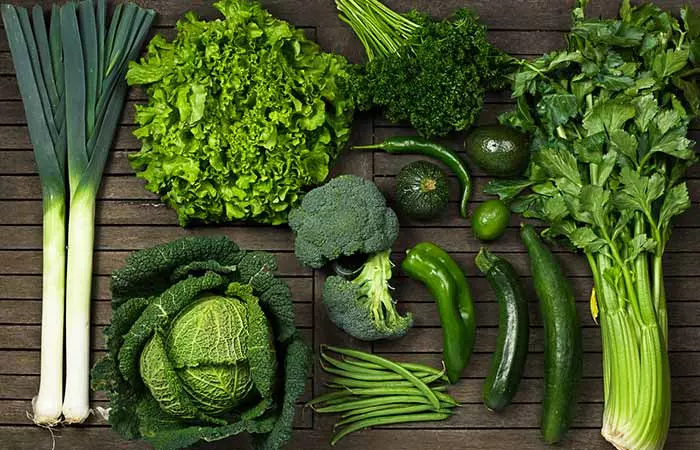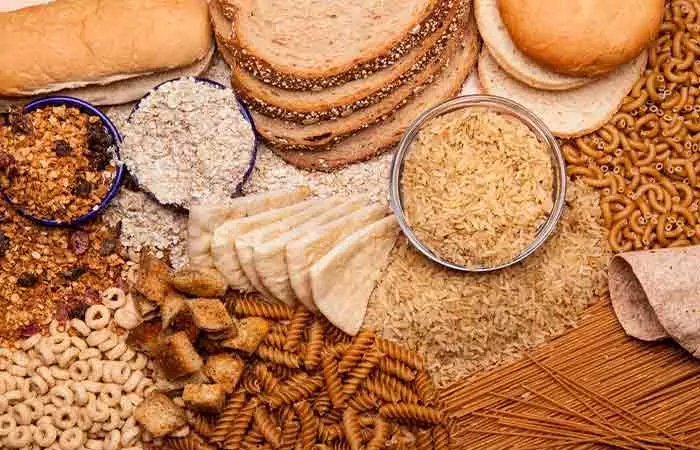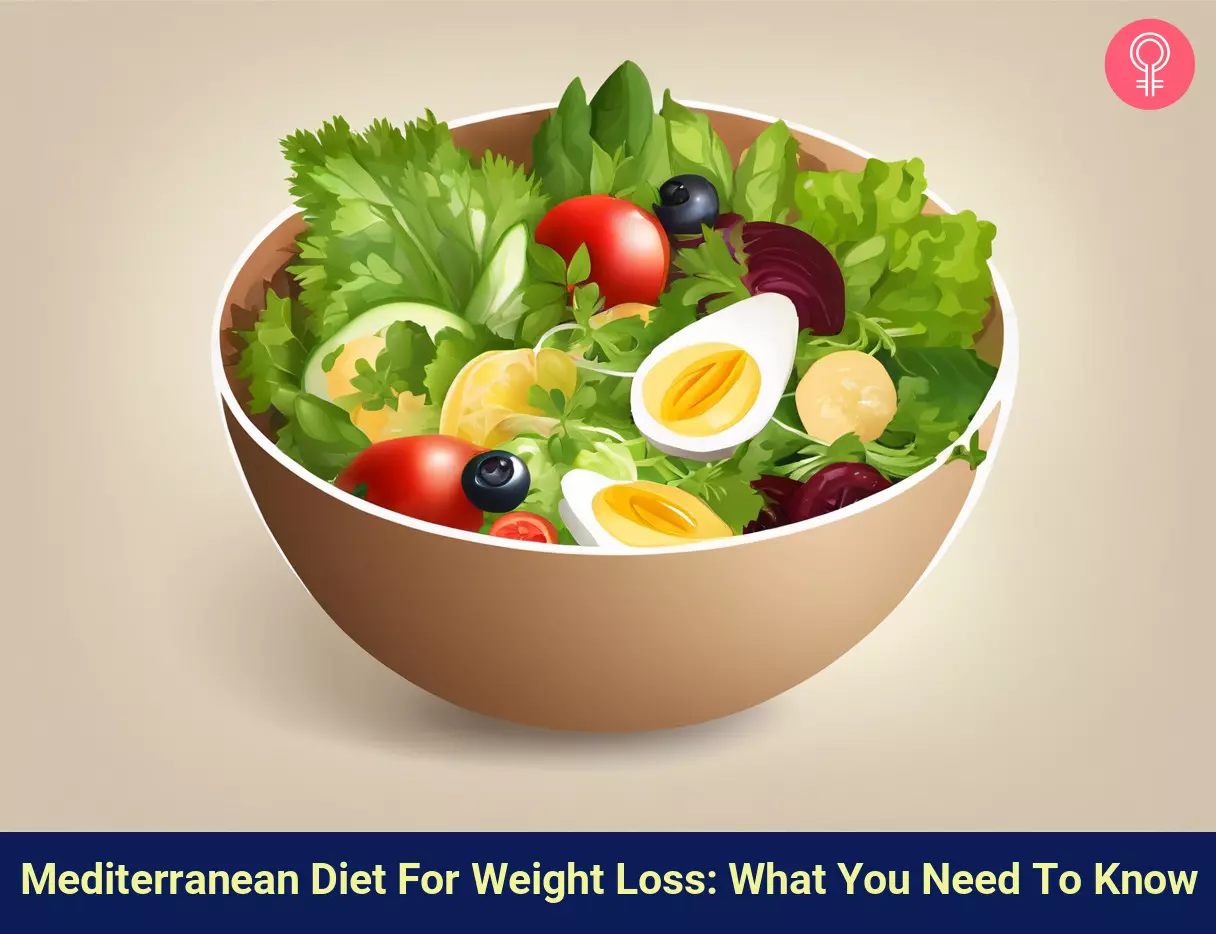The Mediterranean diet is a versatile option for those seeking to lose weight while savoring delicious meals. It is also renowned for its potential to promote heart health, reduce inflammation, enhance cognitive function, and support overall well-being (1). Keep reading to learn more about this nutritious diet and the benefits it has in store for you!
What Is The Mediterranean Diet For Weight Loss?
The Mediterranean diet for weight loss is a wholesome and balanced eating plan based on the traditional foods of Mediterranean countries like Greece, Spain, and Italy. It is not just a short-term regimen but a sustainable lifestyle change that promotes overall health and well-being (1). The diet has gained a lot of attention in recent years not just for its delicious flavors but also for its potential to aid in weight loss. Learn more about it in the next section.
How Effective Is The Mediterranean Diet For Weight Loss?
While the Mediterranean diet may not be strict like some other weight loss diets, several studies suggest that it can indeed help shed pounds when followed consistently. A study published in The New England Journal of Medicine found that individuals following a Mediterranean diet supplemented with extra-virgin olive oil or mixed nuts had a lower risk of obesity. They also were more likely to lose weight than those on a low-fat diet (2). Another study compared a low-fat diet, a low-carb diet, and a Mediterranean diet. While both the low-carb and Mediterranean diets were found to be effective for weight loss, the latter also helped with better blood sugar control. Also, participants on the Mediterranean diet lost an average of 4.4 kg (while those on the low-fat diet lost 2.9 kg) (3). In yet another study conducted on older adults in Spain, the Mediterranean diet was found to help prevent weight gain. Participants who adhered to this diet experienced reductions in body weight and waist circumference (4). The following graph illustrates the differences in how people lost weight after Endoscopic Bariatric Therapy (EBT). Some followed a Mediterranean diet, while others followed a protein diet. Those on the Mediterranean diet, after six months, lost 14.2% more weight than those on the protein diet.
Weight loss six months after surgery as per the diet plan followed
Thus, combining medical treatment and a Mediterranean-style diet might be a good way to promote effective weight loss (5). Several other systematic reviews and meta-analyses have observed a significant connection between long-term adherence to the Mediterranean diet and significant weight loss (6), (7), (8), (9). The Mediterranean diet may not be a quick-fix solution. But it is a sustainable and effective way to achieve and maintain healthy weight when combined with regular physical activity and portion control. Scroll down to the next section to see how this diet may be an effective weight loss plan.
How Does The Mediterranean Diet Work For Weight Loss?
The Mediterranean diet focuses on a high intake of fruits and vegetables that provide essential vitamins, minerals, and dietary fiber and promote a sense of fullness. This makes the diet fundamental to successful weight management (7). Healthy fats from olive oil, nuts, and seeds are another cornerstone of this diet. They are not only satiating but also contribute to heart health (2). They replace unhealthy saturated fats in processed foods and help reduce overall calorie intake and body fat (10), (11). Proteins in the Mediterranean diet come from lean sources such as fish, poultry, and legumes. These are not only lower in saturated fat but also offer essential amino acids to maintain muscle (12). However, if you want to embrace a greener path for your health, you can go with a green Mediterranean diet with plant-based protein. Knowing more about the green Mediterranean diet, its principles, and its benefits can help you reap its advantages more prominently. The whole grains in the diet, such as whole wheat, brown rice, or oats, offer complex carbohydrates that release energy slowly and prevent spikes in blood sugar levels (13). This helps curb cravings and maintain steady energy throughout the day to support one’s weight loss efforts (14). One distinctive feature of this diet is the inclusion of moderate amounts of red wine. Research suggests that the antioxidants in red wine may support heart health (15). However, if you choose to consume alcohol, limit its intake. One glass per day for women and up to two glasses per day for men are ideal (16). The Mediterranean cooking liberally uses herbs and spices to add flavor and depth to meals without the need for excess salt or sugar. This not only enhances the taste but also aligns with the diet’s health-conscious principles.
However, it is important to note that the Mediterranean diet also promotes moderation in all aspects of eating. While it encourages the consumption of nutritious foods, it limits the intake of red and processed meats. These are often high in saturated fats and can contribute to weight gain when consumed excessively (7). However, this doesn’t mean you have to say goodbye to your favorite meats entirely. Moderation is key. In the next section, we learn about the foods that you can indulge in when on this diet.
Foods To Eat
1. Fresh Fruits
Berries Apples Pears Peaches Grape Cherries Citrus fruits
2. Vegetables
Spinach Kale Celery Zucchini Tomatoes Bell peppers Eggplant Asparagus
3. Healthy Fats
Extra virgin olive oil Nuts (almonds and walnuts) Seeds (flaxseeds and chia seeds)
4. Fatty Fish
Salmon Trout Mackerel
5. Lean Proteins
Chicken Turkey Lentils Chickpeas
6. Whole Grains
Wheat Brown rice Bulgur Barley Buckwheat Farro Freekeh Oats
7. Legumes
Beans Lentils Peas
8. Herbs And Spices
Basil Oregano Thyme Garlic Cumin Mint Dill Bay leaf Parsley
9. Dairy
Low-fat yogurt Cheese
Apart from these food options, you can also include some beverages in this dietary plan. Scroll down to learn more about them.
What To Drink
Chamomile tea Mint tea Hibiscus tea
The following drinks can be consumed in moderation to obtain their health benefits. It is also important to familiarize yourself with foods you need to avoid while following this diet. Learn about them in the next section.
Foods To Avoid
1. Processed Foods
Sugary snacks Pastries Sugary beverages Sodas
2. Red And Processed Meats
Beef Pork Sausages Bacon
3. Refined Grains
White bread White rice White flour Corn grits
Following the Mediterranean diet goes beyond including and excluding the aforementioned foods. There are several important factors to consider before adopting this diet. Scroll down to the next section to find out.
Things To Consider When Choosing The Mediterranean Diet
While the Mediterranean diet is popular globally, making the transition requires thoughtful planning and an understanding of potential challenges. Here are some key considerations to keep in mind:
1. Your Current Eating Habits
Assess yourself and understand if you are ready to align yourself with the new diet before you even start it. Examine the list of included and excluded foods and a couple of recipes to see whether they suit your preferences. Prepare yourself to embrace a variety of fresh fruits and vegetables, since they make up a majority of this diet. Variety not only makes the diet more enjoyable but also ensures you receive various essential nutrients.
2. Prior Meal Planning
Proper planning can help you adopt the diet successfully. Creating a weekly meal plan can not only aid in incorporating different dishes into your diet but also help you shop wisely. Get ready to stock your kitchen with Mediterranean staples like olive oil, whole grains, legumes, and an assortment of fruits and vegetables. Be mindful of the quality of ingredients and opt for fresh and minimally processed items as much as possible. Also, familiarize yourself with Mediterranean cooking methods and recipes. Learning them can make the diet more enjoyable.
3. Exercising Portion Control
Although this diet is known for its health benefits, portion control is still essential. Overeating healthy foods can also lead to weight gain. Thus, keep a close eye on your portion sizes.
4. Potential Challenges To Face
Remember that adopting any diet comes with its unique set of challenges. For instance, some people may find the Mediterranean diet restrictive due to the reduced consumption of red meat, processed foods, or sugary snacks. You may also have to navigate social situations where the diet may differ from the norm. Thus, it is important to identify potential obstacles and develop strategies to overcome them. Also, be ready to communicate your dietary preferences and, when necessary, bring a Mediterranean-inspired dish to your social gatherings.
5. Long-Term Commitment
Successful adoption of this diet requires a long-term commitment to a healthier lifestyle. This involves following a good exercise routine as well. On the other hand, the diet can accommodate various dietary restrictions and preferences. Hence, you can tailor the diet accordingly if you prefer vegetarian, vegan, or gluten-free foods. However, if you have underlying health conditions or specific dietary requirements, consult a registered dietitian for personalized advice to ensure you are meeting your nutritional needs. Thus, you can transition to this diet successfully by taking these factors into consideration, planning your meals, and addressing potential challenges. Remember that small, sustainable changes can lead to significant improvements in your overall health over time. While healthy habits may take time to develop, they yield lasting results. You will find that embracing the Mediterranean diet not only benefits your physical health but also offers a delightful culinary experience. Check out the 7-day Mediterranean diet meal plan to make this lifestyle transition even more enjoyable and sustainable.
The Mediterranean Diet Meal Plan For Weight Loss
Here is a sample 7-day Mediterranean diet plan that you can follow: Day 1 Day 2 2 tablespoons of chopped walnuts 1 tablespoon of honey A sprinkle of cinnamon ¼ cup of diced red onion ¼ cup of olives ¼ cup of crumbled feta cheese A dressing made of 2 tablespoons of olive oil, lemon juice, and dried oregano each ½ cup of lean ground turkey ¼ cup of diced tomato ¼ cup of diced zucchini 1 tablespoon of tomato sauce Day 3 ¼ cup of spinach ¼ cup of crumbled feta cheese 1 sliced tomato A dollop of Greek yogurt ¼ cup of diced cucumber ¼ cup of diced tomato 2 tablespoons of hummus 2 tablespoons of crumbled feta cheese Day 4 1 banana ½ cup of diced cucumber ½ cup of diced cherry tomatoes ½ cup of diced red onion 1 teaspoon of lemon juice 1 teaspoon of olive oil 1 teaspoon of fresh herbs 2 cloves of garlic 1 lemon 1 teaspoon of dried oregano Day 5 1 tablespoon of honey ¼ cup of granola 1 diced red bell pepper ¼ cup of chopped red onion 2 tablespoons of olive oil 1 tablespoon of red wine vinegar 4-5 fresh mint leaves Salt and pepper to taste 4-5 fresh dill sprigs 1 tablespoon of olive oil Day 6 ¼ cup of diced red bell pepper 2 tablespoons of feta cheese 4-5 fresh basil leaves for garnish Salt and pepper to taste ¼ cup of diced cucumber ¼ cup of diced tomato 2 tablespoons of hummus 2 tablespoons of crumbled feta cheese 1 tablespoon of lemon juice 1 tablespoon of chopped garlic A sprinkle of dried oregano Day 7 1 banana A drizzle of honey 1 diced red bell pepper ¼ cup of chopped red onion 2 tablespoons of olive oil 1 tablespoon of red wine vinegar 4-5 fresh mint leaves Salt and pepper to taste 2 cloves of garlic 1 tablespoon of fresh lemon juice and zest You can personalize this diet plan according to your dietary needs and preferences along with seasonal ingredient availability. ¼ cup of spinach ¼ cup of crumbled feta cheese 1 sliced tomato 2 cloves of garlic 1 lemon 1 teaspoon of dried oregano ½ cup of diced cucumber ½ cup of diced cherry tomatoes ½ cup of diced red onion 1 teaspoon of lemon juice 1 teaspoon of olive oil 1 teaspoon of fresh herbs Remember that flexibility is key when following this diet. So, feel free to adapt it to your preferences while following the core principles. There are countless ways to make this diet your own. Scroll below to discover a few scrumptious recipes you can experiment with at home.
Mediterranean Diet Recipes For Weight Loss
1. Mediterranean Stuffed Bell Peppers
Serving size: 1.5 stuffed bell pepper halves Ingredients
2 bell peppers ½ cup of cooked brown rice ½ cup of lean ground turkey ¼ cup of diced tomato ¼ cup of diced zucchini 1 tablespoon of tomato sauce
Instructions
2. Greek Yogurt Parfait
Serving size: 3/4th cup of parfait Ingredients
1 cup of Greek yogurt ½ cup of fresh mixed berries 1 tablespoon of honey ¼ cup of granola
Instructions These delicious recipes allow you to experiment with different ingredients and add your twist to them. Aside from following these recipes, keeping a few important tips in mind can help you make this diet a successful one. Scroll down to learn more.
Other Tips
Keep the following tips in mind before you start the Mediterranean Diet to lose weight.
Batch-cook Mediterranean dishes and store them for quick, healthy meals during the week. Read the nutrition labels for added sugars, unhealthy fats, and excessive sodium when purchasing packaged foods. Create balanced meals that include a variety of food groups to ensure you get various essential nutrients and control calorie intake. Avoid mindless snacking in front of the TV or computer, as it can lead to overeating. Aim for at least 150 minutes of moderate-intensity aerobic exercise or 75 minutes of vigorous-intensity exercise every week to enhance weight loss (17). Chronic stress can contribute to weight gain. Thus, incorporate stress-reduction techniques such as yoga, meditation, or deep breathing exercises into your daily routine (18).
However, if you want to know how to lose weight fast at home, there are more ways, such as eating slowly, drinking adequate amounts of water, portion control, etc. What are the cons of the Mediterranean diet for weight loss? The cons of the Mediterranean diet for weight loss include slower initial weight loss compared to some fad diets and the need for long-term commitment. How quickly can I expect to lose weight on the Mediterranean diet? This depends from person to person. Weight loss on the Mediterranean diet varies. Generally, you may notice gradual results over several months rather than rapid changes. Can I lose weight on the Mediterranean diet without counting calories? Yes, you can lose weight on the Mediterranean diet without counting calories. Focus on portion control and choose nutrient-dense foods. Can I eat carbs on the Mediterranean diet and still lose weight? The Mediterranean diet includes healthy carbs like whole grains. So, you can eat them in moderation and still achieve healthy weight loss. This is possible since it is combined with a balanced diet and regular physical activity.
Illustration: Mediterranean Diet For Weight Loss: What You Need To Know
A delightful, easy, and nutritious chicken dish to add to your weekly meals. Check out this video for a flavorful and nutritious culinary experience!

























